Business Law Principles: Case Analysis and Application, Semester 2
VerifiedAdded on 2022/10/16
|7
|1628
|256
Homework Assignment
AI Summary
This document presents a comprehensive solution to a business law assignment, addressing two distinct case studies. The first case focuses on statutory interpretation, specifically the Ellenbrook National Park (Restriction of Entry) Bill, analyzing the application of literal, golden, and mischief rules alongside the Acts Interpretation Act to determine whether a ranger can restrict Mary's entry into the park on a bicycle. The second case delves into contract law, examining exclusion clauses in the context of a Western Rail cloakroom. It explores the validity and incorporation of exclusion clauses through signature, notice, and previous dealings, considering the 'contra proferentem' rule and the doctrine of privity of contract to determine Yvonne's ability to claim losses for a lost bag, including how third-party involvement and the presence or absence of ticket notices affect the outcome. The document includes relevant legal principles, case references, and a conclusion for each scenario, providing a thorough analysis of the legal issues involved.
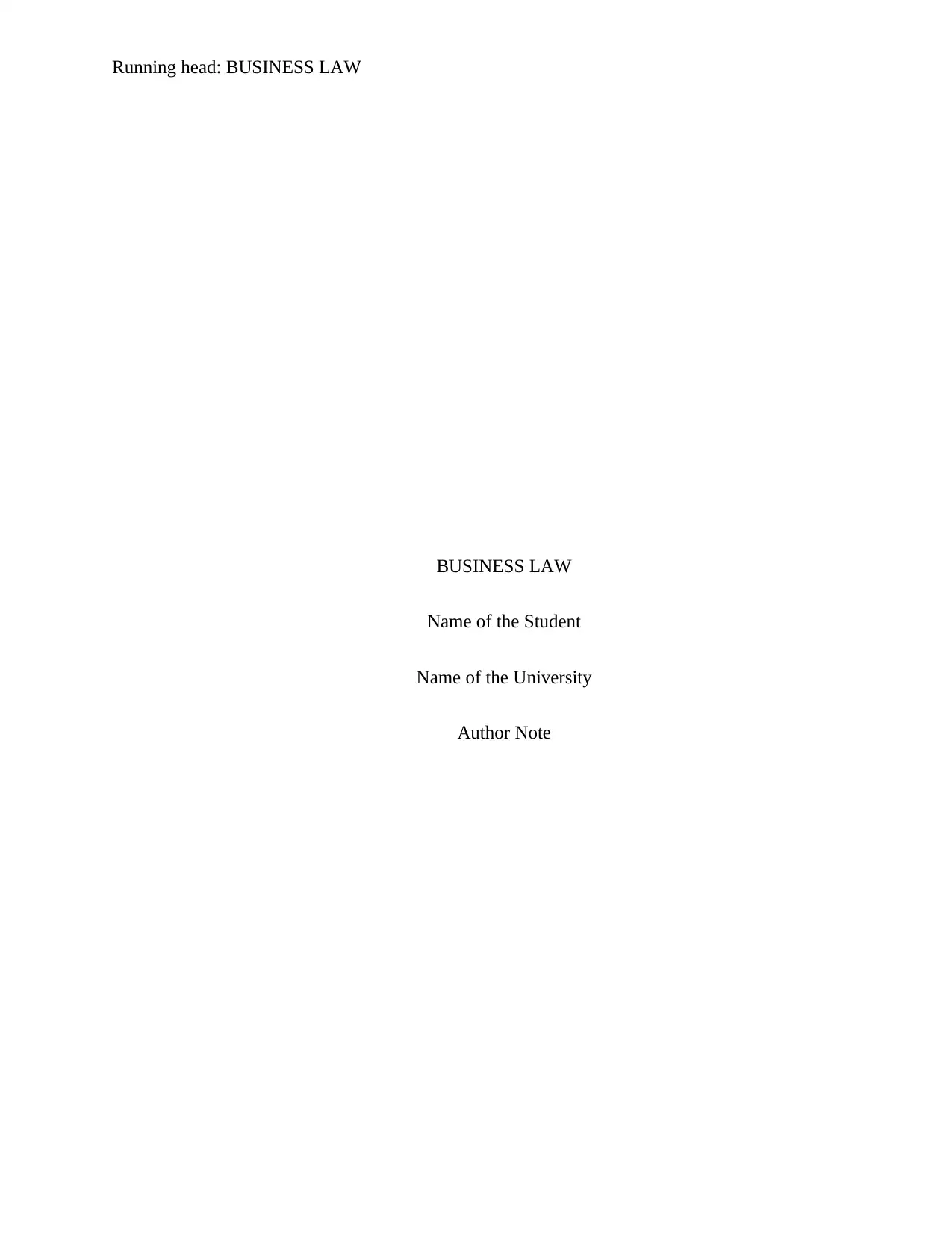
Running head: BUSINESS LAW
BUSINESS LAW
Name of the Student
Name of the University
Author Note
BUSINESS LAW
Name of the Student
Name of the University
Author Note
Paraphrase This Document
Need a fresh take? Get an instant paraphrase of this document with our AI Paraphraser
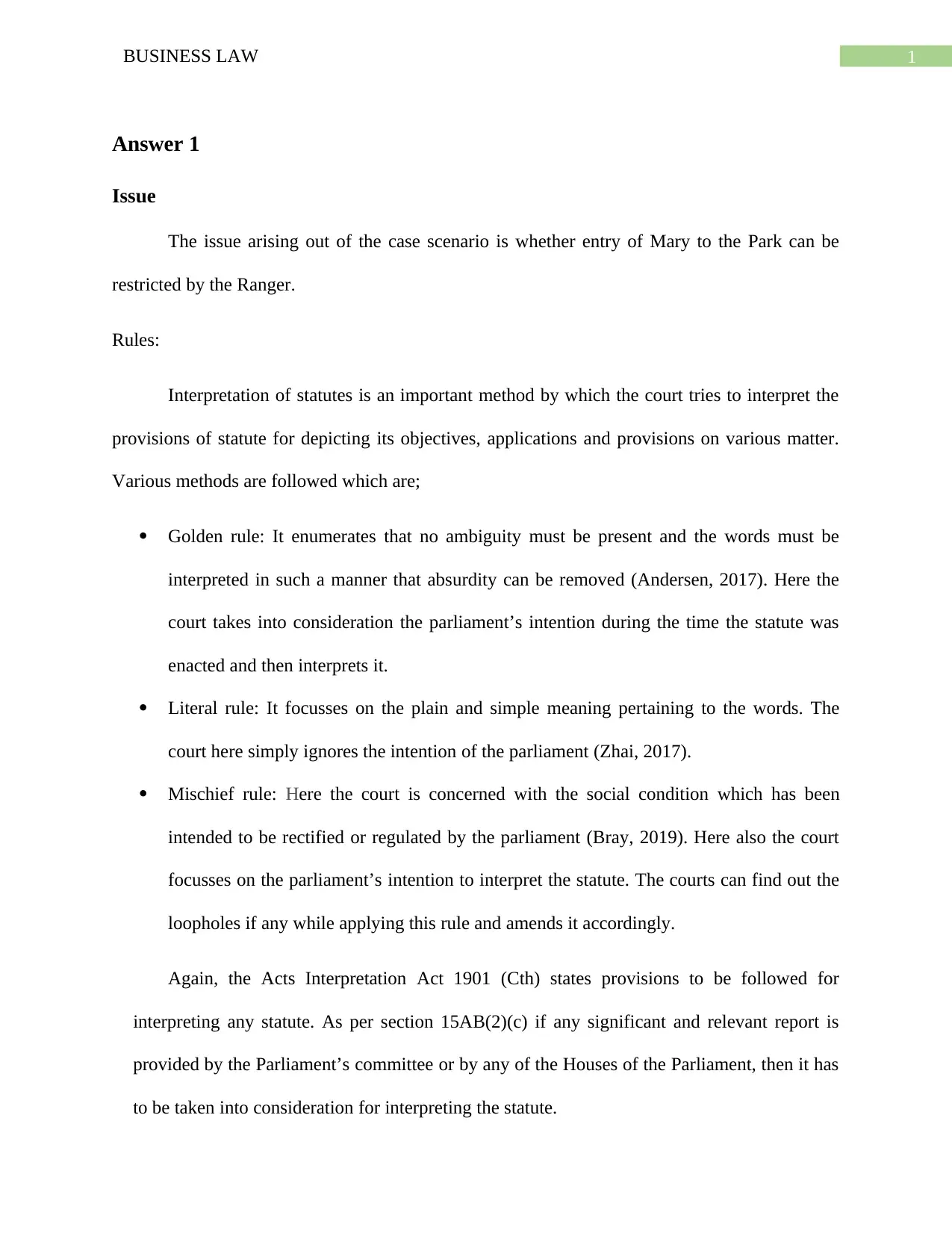
1BUSINESS LAW
Answer 1
Issue
The issue arising out of the case scenario is whether entry of Mary to the Park can be
restricted by the Ranger.
Rules:
Interpretation of statutes is an important method by which the court tries to interpret the
provisions of statute for depicting its objectives, applications and provisions on various matter.
Various methods are followed which are;
Golden rule: It enumerates that no ambiguity must be present and the words must be
interpreted in such a manner that absurdity can be removed (Andersen, 2017). Here the
court takes into consideration the parliament’s intention during the time the statute was
enacted and then interprets it.
Literal rule: It focusses on the plain and simple meaning pertaining to the words. The
court here simply ignores the intention of the parliament (Zhai, 2017).
Mischief rule: Here the court is concerned with the social condition which has been
intended to be rectified or regulated by the parliament (Bray, 2019). Here also the court
focusses on the parliament’s intention to interpret the statute. The courts can find out the
loopholes if any while applying this rule and amends it accordingly.
Again, the Acts Interpretation Act 1901 (Cth) states provisions to be followed for
interpreting any statute. As per section 15AB(2)(c) if any significant and relevant report is
provided by the Parliament’s committee or by any of the Houses of the Parliament, then it has
to be taken into consideration for interpreting the statute.
Answer 1
Issue
The issue arising out of the case scenario is whether entry of Mary to the Park can be
restricted by the Ranger.
Rules:
Interpretation of statutes is an important method by which the court tries to interpret the
provisions of statute for depicting its objectives, applications and provisions on various matter.
Various methods are followed which are;
Golden rule: It enumerates that no ambiguity must be present and the words must be
interpreted in such a manner that absurdity can be removed (Andersen, 2017). Here the
court takes into consideration the parliament’s intention during the time the statute was
enacted and then interprets it.
Literal rule: It focusses on the plain and simple meaning pertaining to the words. The
court here simply ignores the intention of the parliament (Zhai, 2017).
Mischief rule: Here the court is concerned with the social condition which has been
intended to be rectified or regulated by the parliament (Bray, 2019). Here also the court
focusses on the parliament’s intention to interpret the statute. The courts can find out the
loopholes if any while applying this rule and amends it accordingly.
Again, the Acts Interpretation Act 1901 (Cth) states provisions to be followed for
interpreting any statute. As per section 15AB(2)(c) if any significant and relevant report is
provided by the Parliament’s committee or by any of the Houses of the Parliament, then it has
to be taken into consideration for interpreting the statute.
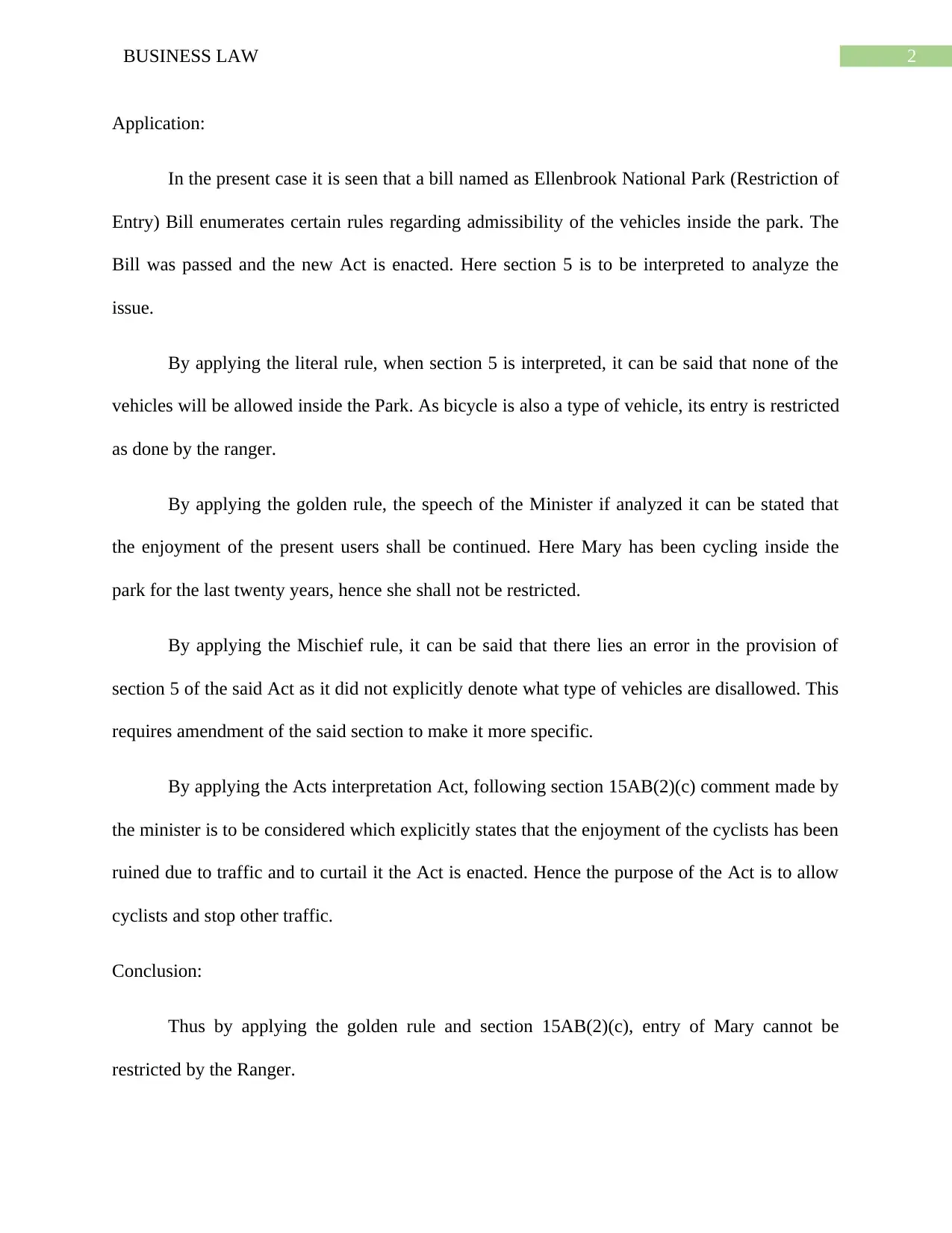
2BUSINESS LAW
Application:
In the present case it is seen that a bill named as Ellenbrook National Park (Restriction of
Entry) Bill enumerates certain rules regarding admissibility of the vehicles inside the park. The
Bill was passed and the new Act is enacted. Here section 5 is to be interpreted to analyze the
issue.
By applying the literal rule, when section 5 is interpreted, it can be said that none of the
vehicles will be allowed inside the Park. As bicycle is also a type of vehicle, its entry is restricted
as done by the ranger.
By applying the golden rule, the speech of the Minister if analyzed it can be stated that
the enjoyment of the present users shall be continued. Here Mary has been cycling inside the
park for the last twenty years, hence she shall not be restricted.
By applying the Mischief rule, it can be said that there lies an error in the provision of
section 5 of the said Act as it did not explicitly denote what type of vehicles are disallowed. This
requires amendment of the said section to make it more specific.
By applying the Acts interpretation Act, following section 15AB(2)(c) comment made by
the minister is to be considered which explicitly states that the enjoyment of the cyclists has been
ruined due to traffic and to curtail it the Act is enacted. Hence the purpose of the Act is to allow
cyclists and stop other traffic.
Conclusion:
Thus by applying the golden rule and section 15AB(2)(c), entry of Mary cannot be
restricted by the Ranger.
Application:
In the present case it is seen that a bill named as Ellenbrook National Park (Restriction of
Entry) Bill enumerates certain rules regarding admissibility of the vehicles inside the park. The
Bill was passed and the new Act is enacted. Here section 5 is to be interpreted to analyze the
issue.
By applying the literal rule, when section 5 is interpreted, it can be said that none of the
vehicles will be allowed inside the Park. As bicycle is also a type of vehicle, its entry is restricted
as done by the ranger.
By applying the golden rule, the speech of the Minister if analyzed it can be stated that
the enjoyment of the present users shall be continued. Here Mary has been cycling inside the
park for the last twenty years, hence she shall not be restricted.
By applying the Mischief rule, it can be said that there lies an error in the provision of
section 5 of the said Act as it did not explicitly denote what type of vehicles are disallowed. This
requires amendment of the said section to make it more specific.
By applying the Acts interpretation Act, following section 15AB(2)(c) comment made by
the minister is to be considered which explicitly states that the enjoyment of the cyclists has been
ruined due to traffic and to curtail it the Act is enacted. Hence the purpose of the Act is to allow
cyclists and stop other traffic.
Conclusion:
Thus by applying the golden rule and section 15AB(2)(c), entry of Mary cannot be
restricted by the Ranger.
⊘ This is a preview!⊘
Do you want full access?
Subscribe today to unlock all pages.

Trusted by 1+ million students worldwide
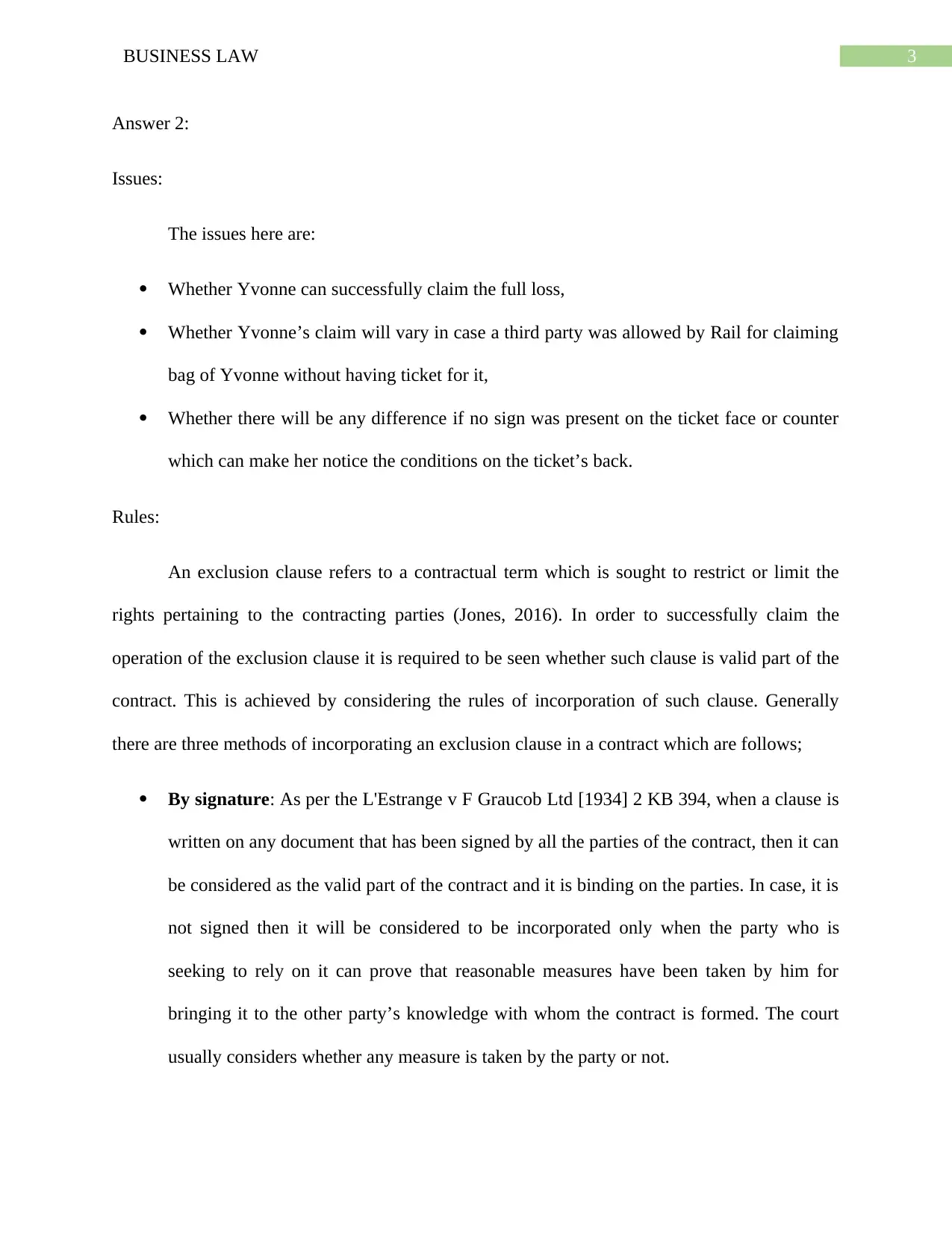
3BUSINESS LAW
Answer 2:
Issues:
The issues here are:
Whether Yvonne can successfully claim the full loss,
Whether Yvonne’s claim will vary in case a third party was allowed by Rail for claiming
bag of Yvonne without having ticket for it,
Whether there will be any difference if no sign was present on the ticket face or counter
which can make her notice the conditions on the ticket’s back.
Rules:
An exclusion clause refers to a contractual term which is sought to restrict or limit the
rights pertaining to the contracting parties (Jones, 2016). In order to successfully claim the
operation of the exclusion clause it is required to be seen whether such clause is valid part of the
contract. This is achieved by considering the rules of incorporation of such clause. Generally
there are three methods of incorporating an exclusion clause in a contract which are follows;
By signature: As per the L'Estrange v F Graucob Ltd [1934] 2 KB 394, when a clause is
written on any document that has been signed by all the parties of the contract, then it can
be considered as the valid part of the contract and it is binding on the parties. In case, it is
not signed then it will be considered to be incorporated only when the party who is
seeking to rely on it can prove that reasonable measures have been taken by him for
bringing it to the other party’s knowledge with whom the contract is formed. The court
usually considers whether any measure is taken by the party or not.
Answer 2:
Issues:
The issues here are:
Whether Yvonne can successfully claim the full loss,
Whether Yvonne’s claim will vary in case a third party was allowed by Rail for claiming
bag of Yvonne without having ticket for it,
Whether there will be any difference if no sign was present on the ticket face or counter
which can make her notice the conditions on the ticket’s back.
Rules:
An exclusion clause refers to a contractual term which is sought to restrict or limit the
rights pertaining to the contracting parties (Jones, 2016). In order to successfully claim the
operation of the exclusion clause it is required to be seen whether such clause is valid part of the
contract. This is achieved by considering the rules of incorporation of such clause. Generally
there are three methods of incorporating an exclusion clause in a contract which are follows;
By signature: As per the L'Estrange v F Graucob Ltd [1934] 2 KB 394, when a clause is
written on any document that has been signed by all the parties of the contract, then it can
be considered as the valid part of the contract and it is binding on the parties. In case, it is
not signed then it will be considered to be incorporated only when the party who is
seeking to rely on it can prove that reasonable measures have been taken by him for
bringing it to the other party’s knowledge with whom the contract is formed. The court
usually considers whether any measure is taken by the party or not.
Paraphrase This Document
Need a fresh take? Get an instant paraphrase of this document with our AI Paraphraser
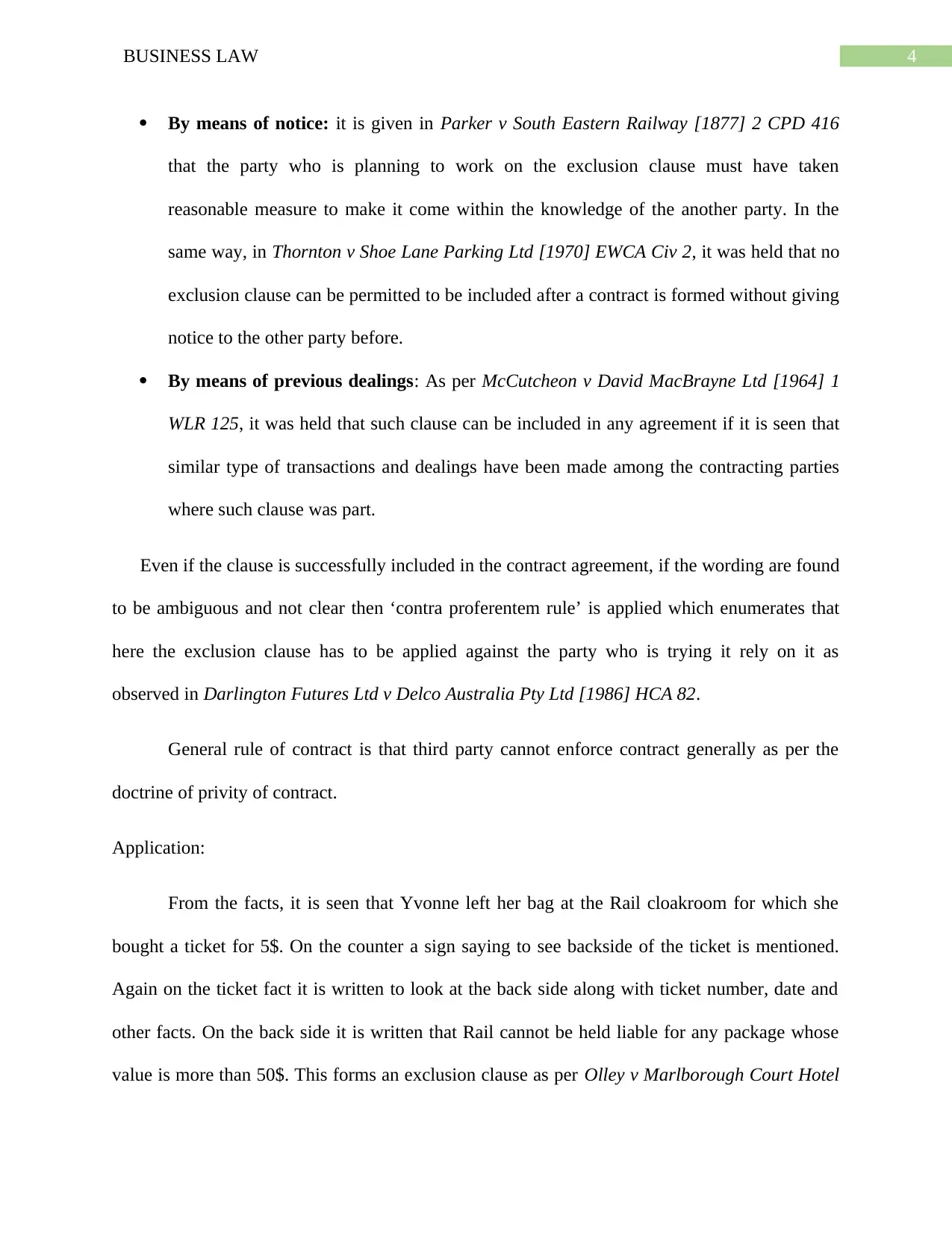
4BUSINESS LAW
By means of notice: it is given in Parker v South Eastern Railway [1877] 2 CPD 416
that the party who is planning to work on the exclusion clause must have taken
reasonable measure to make it come within the knowledge of the another party. In the
same way, in Thornton v Shoe Lane Parking Ltd [1970] EWCA Civ 2, it was held that no
exclusion clause can be permitted to be included after a contract is formed without giving
notice to the other party before.
By means of previous dealings: As per McCutcheon v David MacBrayne Ltd [1964] 1
WLR 125, it was held that such clause can be included in any agreement if it is seen that
similar type of transactions and dealings have been made among the contracting parties
where such clause was part.
Even if the clause is successfully included in the contract agreement, if the wording are found
to be ambiguous and not clear then ‘contra proferentem rule’ is applied which enumerates that
here the exclusion clause has to be applied against the party who is trying it rely on it as
observed in Darlington Futures Ltd v Delco Australia Pty Ltd [1986] HCA 82.
General rule of contract is that third party cannot enforce contract generally as per the
doctrine of privity of contract.
Application:
From the facts, it is seen that Yvonne left her bag at the Rail cloakroom for which she
bought a ticket for 5$. On the counter a sign saying to see backside of the ticket is mentioned.
Again on the ticket fact it is written to look at the back side along with ticket number, date and
other facts. On the back side it is written that Rail cannot be held liable for any package whose
value is more than 50$. This forms an exclusion clause as per Olley v Marlborough Court Hotel
By means of notice: it is given in Parker v South Eastern Railway [1877] 2 CPD 416
that the party who is planning to work on the exclusion clause must have taken
reasonable measure to make it come within the knowledge of the another party. In the
same way, in Thornton v Shoe Lane Parking Ltd [1970] EWCA Civ 2, it was held that no
exclusion clause can be permitted to be included after a contract is formed without giving
notice to the other party before.
By means of previous dealings: As per McCutcheon v David MacBrayne Ltd [1964] 1
WLR 125, it was held that such clause can be included in any agreement if it is seen that
similar type of transactions and dealings have been made among the contracting parties
where such clause was part.
Even if the clause is successfully included in the contract agreement, if the wording are found
to be ambiguous and not clear then ‘contra proferentem rule’ is applied which enumerates that
here the exclusion clause has to be applied against the party who is trying it rely on it as
observed in Darlington Futures Ltd v Delco Australia Pty Ltd [1986] HCA 82.
General rule of contract is that third party cannot enforce contract generally as per the
doctrine of privity of contract.
Application:
From the facts, it is seen that Yvonne left her bag at the Rail cloakroom for which she
bought a ticket for 5$. On the counter a sign saying to see backside of the ticket is mentioned.
Again on the ticket fact it is written to look at the back side along with ticket number, date and
other facts. On the back side it is written that Rail cannot be held liable for any package whose
value is more than 50$. This forms an exclusion clause as per Olley v Marlborough Court Hotel
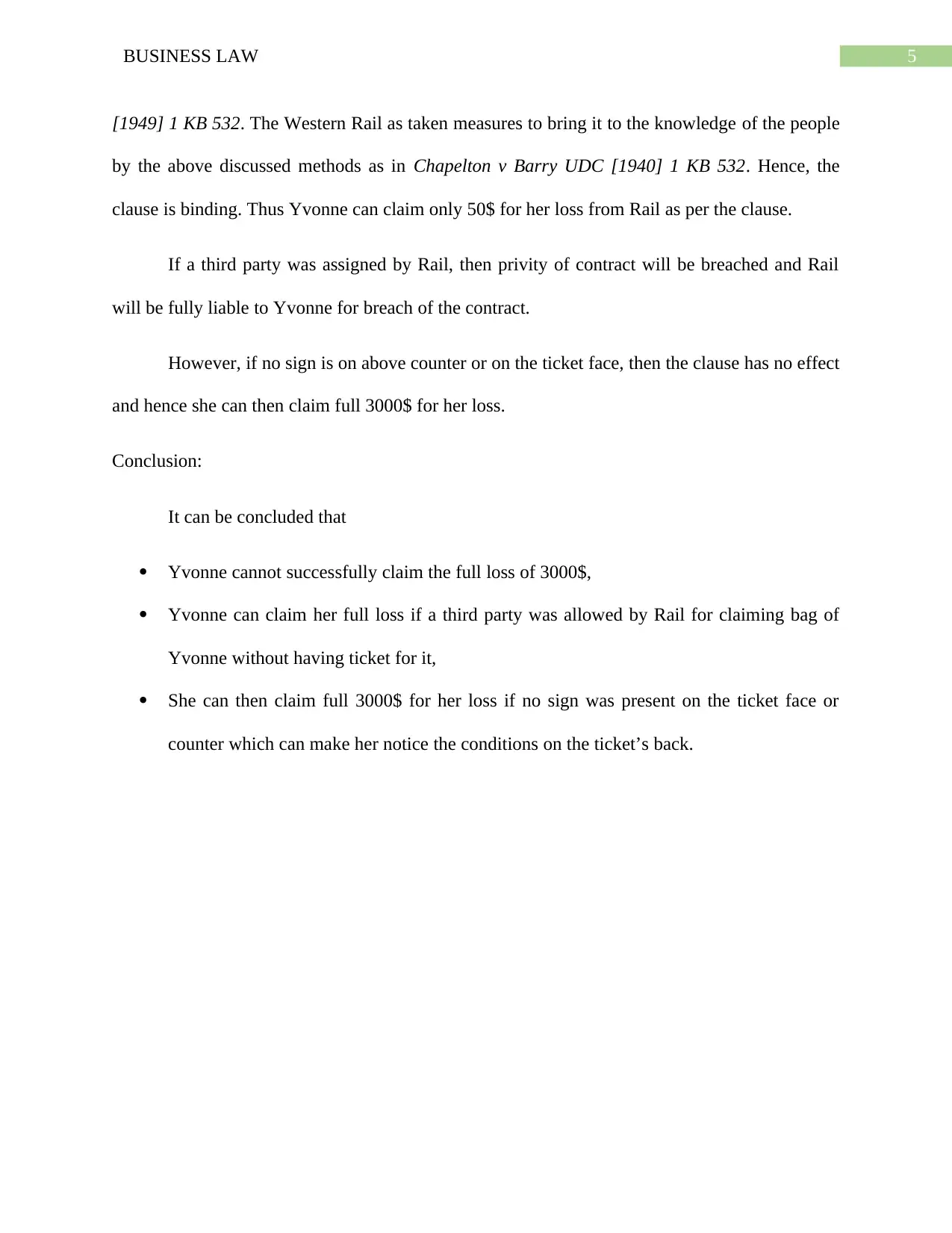
5BUSINESS LAW
[1949] 1 KB 532. The Western Rail as taken measures to bring it to the knowledge of the people
by the above discussed methods as in Chapelton v Barry UDC [1940] 1 KB 532. Hence, the
clause is binding. Thus Yvonne can claim only 50$ for her loss from Rail as per the clause.
If a third party was assigned by Rail, then privity of contract will be breached and Rail
will be fully liable to Yvonne for breach of the contract.
However, if no sign is on above counter or on the ticket face, then the clause has no effect
and hence she can then claim full 3000$ for her loss.
Conclusion:
It can be concluded that
Yvonne cannot successfully claim the full loss of 3000$,
Yvonne can claim her full loss if a third party was allowed by Rail for claiming bag of
Yvonne without having ticket for it,
She can then claim full 3000$ for her loss if no sign was present on the ticket face or
counter which can make her notice the conditions on the ticket’s back.
[1949] 1 KB 532. The Western Rail as taken measures to bring it to the knowledge of the people
by the above discussed methods as in Chapelton v Barry UDC [1940] 1 KB 532. Hence, the
clause is binding. Thus Yvonne can claim only 50$ for her loss from Rail as per the clause.
If a third party was assigned by Rail, then privity of contract will be breached and Rail
will be fully liable to Yvonne for breach of the contract.
However, if no sign is on above counter or on the ticket face, then the clause has no effect
and hence she can then claim full 3000$ for her loss.
Conclusion:
It can be concluded that
Yvonne cannot successfully claim the full loss of 3000$,
Yvonne can claim her full loss if a third party was allowed by Rail for claiming bag of
Yvonne without having ticket for it,
She can then claim full 3000$ for her loss if no sign was present on the ticket face or
counter which can make her notice the conditions on the ticket’s back.
⊘ This is a preview!⊘
Do you want full access?
Subscribe today to unlock all pages.

Trusted by 1+ million students worldwide
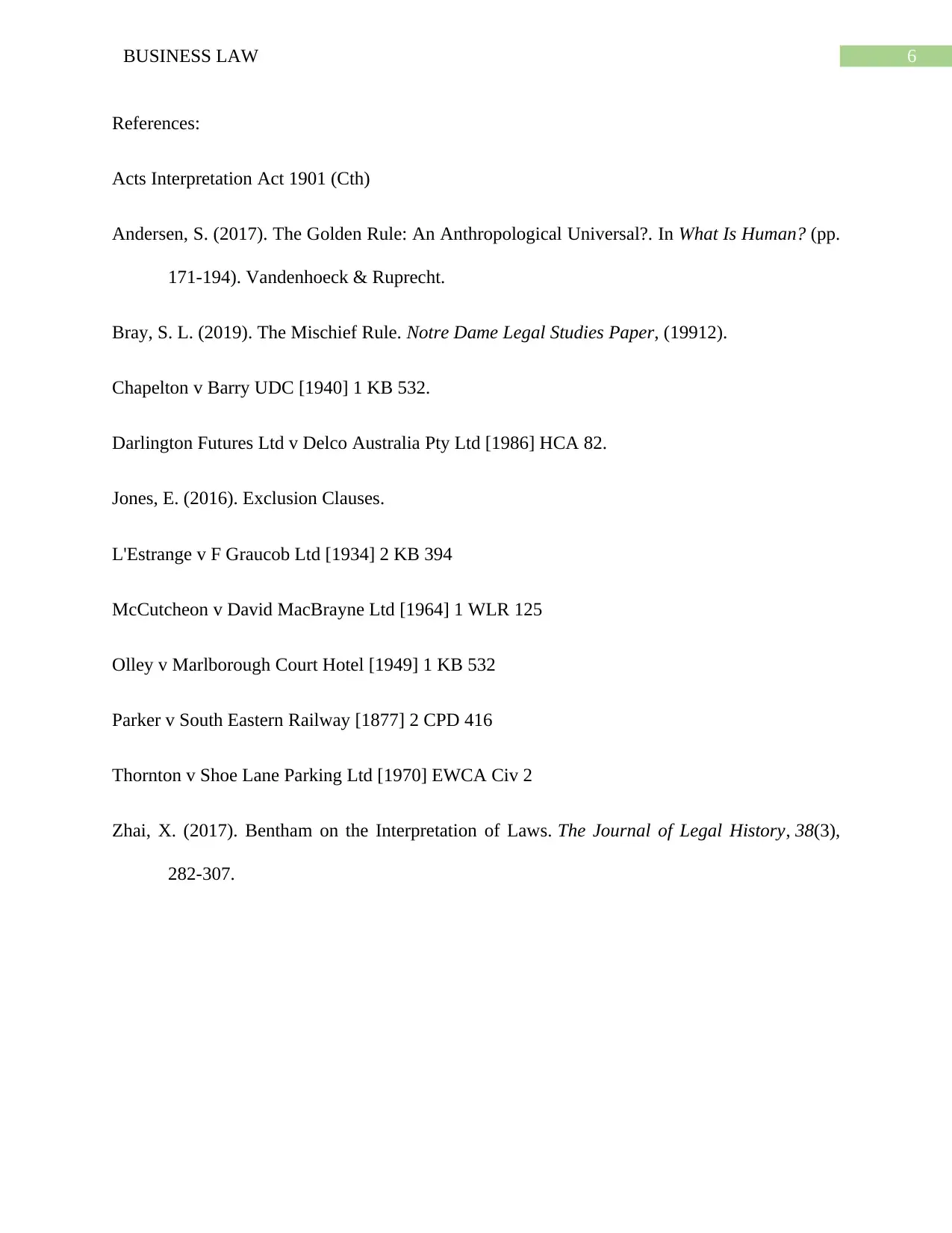
6BUSINESS LAW
References:
Acts Interpretation Act 1901 (Cth)
Andersen, S. (2017). The Golden Rule: An Anthropological Universal?. In What Is Human? (pp.
171-194). Vandenhoeck & Ruprecht.
Bray, S. L. (2019). The Mischief Rule. Notre Dame Legal Studies Paper, (19912).
Chapelton v Barry UDC [1940] 1 KB 532.
Darlington Futures Ltd v Delco Australia Pty Ltd [1986] HCA 82.
Jones, E. (2016). Exclusion Clauses.
L'Estrange v F Graucob Ltd [1934] 2 KB 394
McCutcheon v David MacBrayne Ltd [1964] 1 WLR 125
Olley v Marlborough Court Hotel [1949] 1 KB 532
Parker v South Eastern Railway [1877] 2 CPD 416
Thornton v Shoe Lane Parking Ltd [1970] EWCA Civ 2
Zhai, X. (2017). Bentham on the Interpretation of Laws. The Journal of Legal History, 38(3),
282-307.
References:
Acts Interpretation Act 1901 (Cth)
Andersen, S. (2017). The Golden Rule: An Anthropological Universal?. In What Is Human? (pp.
171-194). Vandenhoeck & Ruprecht.
Bray, S. L. (2019). The Mischief Rule. Notre Dame Legal Studies Paper, (19912).
Chapelton v Barry UDC [1940] 1 KB 532.
Darlington Futures Ltd v Delco Australia Pty Ltd [1986] HCA 82.
Jones, E. (2016). Exclusion Clauses.
L'Estrange v F Graucob Ltd [1934] 2 KB 394
McCutcheon v David MacBrayne Ltd [1964] 1 WLR 125
Olley v Marlborough Court Hotel [1949] 1 KB 532
Parker v South Eastern Railway [1877] 2 CPD 416
Thornton v Shoe Lane Parking Ltd [1970] EWCA Civ 2
Zhai, X. (2017). Bentham on the Interpretation of Laws. The Journal of Legal History, 38(3),
282-307.
1 out of 7
Related Documents
Your All-in-One AI-Powered Toolkit for Academic Success.
+13062052269
info@desklib.com
Available 24*7 on WhatsApp / Email
![[object Object]](/_next/static/media/star-bottom.7253800d.svg)
Unlock your academic potential
Copyright © 2020–2025 A2Z Services. All Rights Reserved. Developed and managed by ZUCOL.





